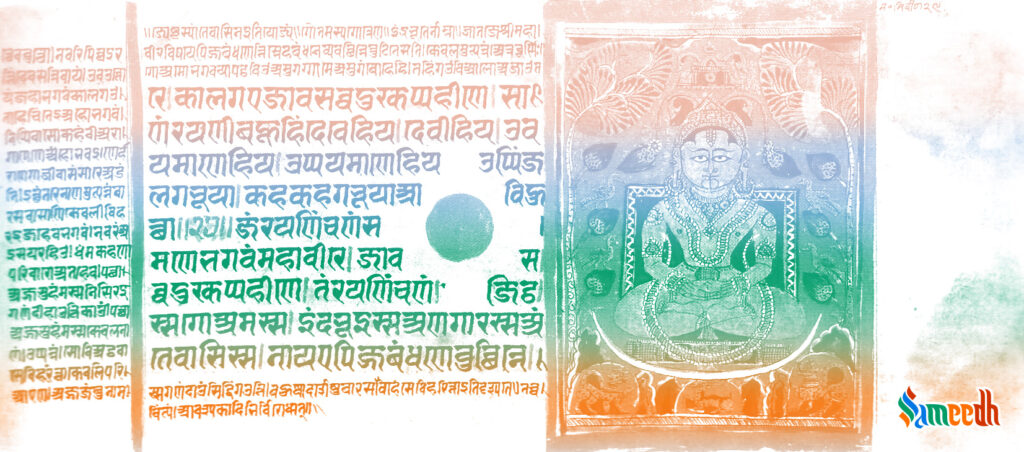The Kalpa Sutra forms an important part of the Vedanga and details how the rituals need to be practiced during our whole life and different stages.

Kalpasutra folio on Mahavira Nirvana; Image Source: Anish Shah
ORIGIN
A Part of the Vedanga
Kalpa is known as an ancillary science which was created to help people apply the knowledge and learnings of the Vedas to their life. It details how people should practice different ceremonies at different stages of life. It was created as one of the six components of Vedanga in the ancient times to create a better understanding of how the Vedas and Hinduism believes one should practice different rituals to lead a holistic and fulfilling life.
ETYMOLOGY
The Proper Way
The word Kalpa in Sanskrit means, ‘Proper’. It basically elucidates how the rituals should be carried out in a proper way to align their life with the principles and rituals of Hinduism. It guides the people to follow the proper procedure that needs to be followed and practiced at different stages of life and death. It helps them practice Hinduism properly as explained by the knowledge of Vedas. It has its origin in the need of the proper ways and practices that need to be followed by priests in different ceremonies like wedding ceremonies, naming ceremony of a baby etc. These practices and prescribed methodology in Kalpa Sutra explained the priests how to conduct the ceremonies as prescribed by the Vedas.
SIGNIFICANCE
At Every Step of Life
The Kalpa Sutra is primarily divided into two important parts, Shrautasutra and Smrtasutra. These two types of disciplines explain how different rules of ceremonies need to be carried out by the priests. The Shrautasutra explains the correct methodology that needs to be followed for ritual sacrifices. The Smrtasutra explains how different procedured need to be followed for different domestic ceremonies like marriage, birth of a child etc. The Smrtasutra includes Grhyasutra which includes different procedures that need to be followed for all the domestic rituals. Another important component of Kalpa Sutra is the Shulba Sutra which is the mathematical explanation and procedure for the right way to construct altars for different ceremonies. It focuses on how to install the altars correctly.
ANCIENT PRACTICES
Since the Age of Vedas
The Kalpa Sutra can be dated back to the 1st millennium BCE. It can be found originating after the Vedas came into prominence. It came into being for the needs of the priests and the people who wanted to live their lives according to the Vedas and the philosophy of Vedic practices.
MODERN USAGE
Contemporary Relevance of Rituals
The relevance of the rituals and the procedures explained in the Kalpa Sutra can be found in our modern lifestyle as well. With the emergence of a balanced yet religious lifestyle being followed by many youngsters who follow Hinduism, they try to live their lives according to the teachings of the Vedas. They try to incorporate as many rituals as possible into their lifestyle. For example, many people try to name their newborn according to these rituals. Many people try to get married according to the ceremonies prescribed by the Vedic rituals.
A Vedanga that guides everyone
The whole theory and practices explained by the Kalpa Sutra helps the people lead their lifestyle in a proper way which keeps them connected to the teachings of the Vedas. It guides priests in a simple and elaborate way to conduct all the ceremonies that are needed at every stage of life.
To understand Hindu disciplines better, keep reading the blog posts on Sameedh.